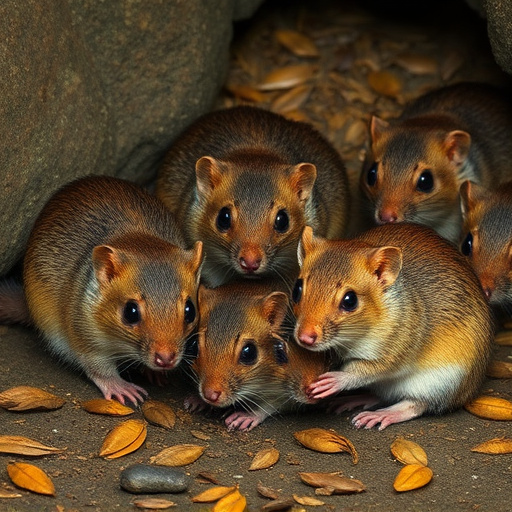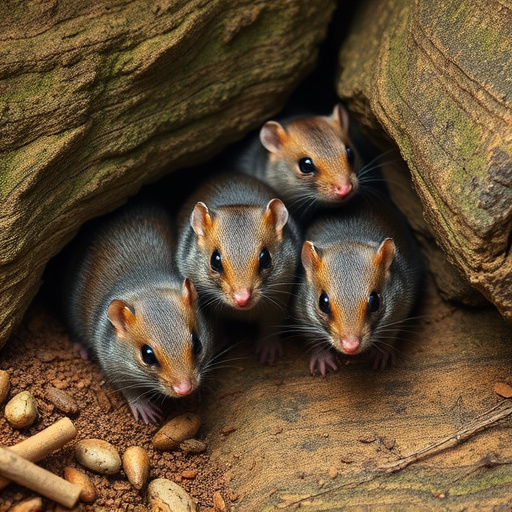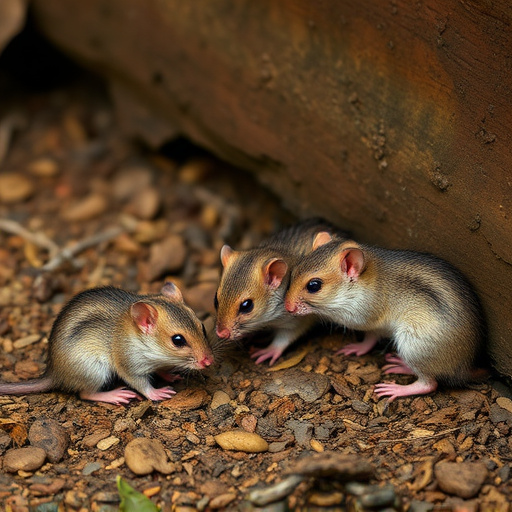Rodent problems in Marana, Arizona, driven by Tucson's ecosystem, require eco-friendly and humane solutions. Traditional toxic chemicals and traps harm wildlife, so alternative methods like habitat modification, natural repellents (e.g., peppermint oil), and exclusion strategies are crucial. Humane trapping techniques capture rodents safely without causing stress or secondary infestations. Natural deterrents like lavender and catnip repel pests without harming ecosystems. Community engagement through education and volunteer programs promotes these practices. Long-term urban planning, including waste management, natural predator habitats, and physical barriers, reduces rodent populations sustainably. Rodent control Tucson prioritizes these eco-friendly methods for a healthier environment.
Marana, a vibrant community in Tucson, faces challenges with rodent infestations, requiring effective yet eco-friendly solutions. This article explores innovative approaches to rodent control, focusing on methods that balance environmental sustainability and humane treatment of these creatures. We examine traditional vs. eco-friendly options, from trapping techniques to natural deterrents, offering a comprehensive guide for Marana residents and businesses aiming to manage rodent populations humanely and responsibly, while also addressing the broader issues of urban planning and community education in the context of Tucson’s rodent control.
- Understanding Rodent Problems in Marana, Tucson
- Traditional vs. Eco-friendly Rat and Mouse Control
- Humane Trapping Techniques and Their Benefits
- Natural Repellents and Deterrents for Rodent Management
- Community Engagement and Education Programs
- Long-term Solutions: Urban Planning and Habitat Modification
Understanding Rodent Problems in Marana, Tucson

Rodent problems in Marana, like many areas, are a common concern for residents and businesses alike. Tucson’s unique ecosystem attracts various rodent species, including squirrels, rats, and mice, which can quickly turn into persistent infestations. These rodents not only cause damage to properties but also pose health risks by carrying diseases and destroying food sources. Understanding the behavior and habitats of these pests is crucial in implementing effective yet eco-friendly and humane rodent control methods suitable for Marana’s environment.
Local ecologies, such as those found in Marana, often require tailored solutions because traditional trapping and pesticide methods can be harmful to non-target species and contribute to environmental pollution. With a focus on sustainability and animal welfare, residents and professionals can explore alternative strategies. This includes habitat modification, exclusionary measures, and the use of natural repellents. By adopting these eco-conscious practices, Marana can achieve effective rodent control while preserving its rich biodiversity and maintaining a healthier, more sustainable environment for both humans and wildlife.
Traditional vs. Eco-friendly Rat and Mouse Control

In Marana, as across Tucson, traditional rodent control methods often rely on toxic chemicals and traps, which can be harmful to both wildlife and pets. These conventional practices may provide quick relief but can also cause significant ecological damage and pose health risks. On the other hand, eco-friendly rat and mouse control approaches offer a more sustainable and humane alternative.
By adopting eco-friendly techniques, Marana residents can effectively manage rodent populations without resorting to toxic substances or cruel traps. These methods include using natural repellents, promoting habitat modification, and implementing exclusion strategies. For instance, non-toxic baits made from ingredients like peppermint oil or capsicum can deter rodents, while ensuring they don’t cause harm to other species or the environment. Additionally, sealing entry points and maintaining a clean environment significantly reduces rodent attraction. These eco-conscious practices not only protect local ecosystems but also contribute to a healthier and safer Marana for both residents and wildlife.
Humane Trapping Techniques and Their Benefits

In the quest for effective yet eco-friendly rodent control in Marana, humane trapping techniques stand out as a preferred approach. These methods, available in Tucson and beyond, prioritize the well-being of both the rodents and the environment, offering a peaceful resolution to unwanted pest presence. Instead of causing harm, these traps capture mice or rats safely, allowing for subsequent release back into their natural habitats.
The benefits are manifold: reduced stress on wildlife, prevention of secondary infestations as captured rodents don’t leave behind dead bodies that attract more pests, and no exposure to toxic chemicals. Humane trapping also aligns with the growing demand for environmentally conscious pest management practices, making it a responsible choice for both residents and businesses seeking rodent control in Tucson.
Natural Repellents and Deterrents for Rodent Management

In the quest for effective yet eco-friendly rodent control in Marana, natural repellents and deterrents offer a promising alternative to traditional methods. These solutions, often derived from plants and essential oils, can be highly potent in keeping rodents at bay without causing harm to local ecosystems or pets. For instance, products containing peppermint oil, cinnamon, or cloves have been shown to repel mice and rats due to their strong scents, providing a non-toxic way to manage these pests in residential areas.
Tucson residents can leverage the power of nature by strategically placing these natural deterrents around problem areas. Plants like lavender, lemongrass, and catnip are known for their rodent-repelling properties and can be grown or purchased in potted forms for easy placement. By integrating these natural solutions into Marana’s rodent control strategies, residents contribute to a healthier environment while enjoying an effective and humane approach to pest management, aligning with the city’s commitment to sustainability.
Community Engagement and Education Programs

In the pursuit of eco-friendly and humane rodent control in Marana, community engagement plays a pivotal role. Educating residents about the importance of responsible pest management is the first step. Programs that raise awareness about the impact of traditional rodent control methods on local ecosystems and wildlife can foster a collective understanding and willingness to adopt alternative solutions. By empowering folks with knowledge, these initiatives encourage the use of non-lethal tactics, such as habitat modification, sanitation improvements, and trap-and-release programs. This collaborative approach not only aligns with Tucson’s commitment to eco-friendly practices but also ensures the well-being of both humans and rodents in the community.
Community engagement goes beyond education; it involves active participation in implementing these alternative methods. Local volunteers and residents can assist in monitoring and maintaining rodent control strategies, ensuring their effectiveness while minimizing harm. Such initiatives not only address the rodent problem in Marana but also create a more sustainable and harmonious relationship between humans and nature, making Tucson a beacon for eco-conscious urban living.
Long-term Solutions: Urban Planning and Habitat Modification

In addressing rodent control in Marana, long-term solutions focused on urban planning and habitat modification are crucial for both eco-friendly and humane approaches. Implementing thoughtful city design can significantly reduce rodent populations by minimizing suitable habitats. This includes proper waste management systems to eliminate food sources, enhancing landscapes with natural predators like birds of prey and beneficial insects, and creating physical barriers to prevent rodents from accessing residential and commercial areas.
For instance, Tucson has pioneered some effective urban planning strategies in rodent control. These involve strategic vegetation trimming to deny rodents shelter, well-designed storm drains that prevent water accumulation (a key attractant for rodents), and the integration of green spaces that support natural predators. By adopting such measures, Marana can not only manage existing rodent issues but also create a more sustainable and harmonious environment, making it an example for effective rodent control in Arizona.
In addressing rodent control in Marana, adopting eco-friendly and humane methods is a responsible step forward. By understanding the specific challenges faced in this Tucson area, we can effectively manage rodent populations without causing harm to local ecosystems or wildlife. Integrating natural solutions, such as repellent plants and habitat modification, along with community education, offers a sustainable and compassionate approach to rodent control, ensuring a safer and more harmonious environment for both residents and wild creatures alike. These strategies not only benefit Marana but also serve as models for effective rodent management across Tucson and beyond.
